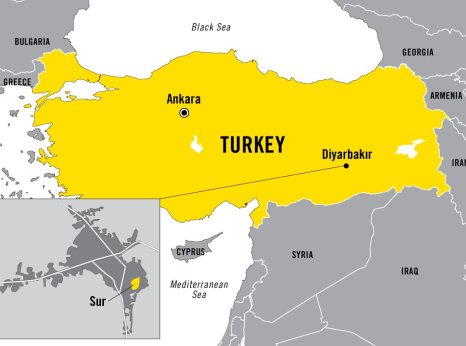Turkey: Eritreans At Imminent Risk Of Forced Return

Türkiye is party to the 1951 Refugee Convention and its 1967 Protocol. However, Türkiye retains a geographic reservation to its ratification of the Convention, so that only citizens from Council of Europe member states are allowed to apply for refugee status. People who do not qualify for refugee status in Türkiye, can request conditional refugee status or subsidiary protection under the Law on Foreigners and International Protection of 2013. The conditional refugee status was created for people originating from “non-European” states and provides more restrictive rights than the ones granted to refugee status holders.
Amnesty International has found that the Eritrean authorities regard the act of applying for asylum abroad as evidence of treason, and a reason to detain anyone forcibly returned to Eritrea. Appalling detention conditions in Eritrea amount to cruel, inhuman or degrading treatment. The United Nations High Commissioner for Refugees (UNHCR) has noted that “Eritreans who are forcibly returned may, according to several reports, face arrest without charge, detention, ill-treatment, torture sometimes death at the hands of the authorities. They are reportedly held incommunicado, in over-crowded and unhygienic conditions, with little access to medical care, sometimes for extended periods of time” and that “For some Eritreans, being outside the country may be sufficient cause on return to be subjected to scrutiny, reprisals and harsh treatment. Individuals may be suspected of having sought asylum, participating in diaspora-based opposition meetings or otherwise posing a (real or perceived) threat to the Government, particularly where they have exited the country illegally.” Furthermore, in 2015, the UN Human Rights Council Commission of Inquiry on human rights in Eritrea found that ‘’with a few exceptions, those who have been forced to return to the country have been arrested, detained and subjected to ill-treatment and torture.’’
According to a 2016 Amnesty International report, deserters are likely to face prolonged arbitrary detention, inhumane detention conditions and torture and other-ill treatment. National service is compulsory for all men and women between the ages of 18 and 40 in Eritrea, with additional mandatory reserve duties up to age 50. There is no limit on length of service. Initially 18 months long, it generally includes six months’ military service followed by 12 months’ deployment in military or government service. However, this is frequently extended indefinitely. National service often involves forced or involuntary labour in state projects. Conscripts perform construction labour on government projects such as road building, work in the civil service or work for companies owned and operated by the military or ruling party elites. Conscripts are paid minimal salaries that do not meet the basic needs of their families. Much of the adult population of Eritrea is currently engaged in mandatory national service. There is no exemption from military service for conscientious objectors, and no alternative non-military service. The usual punishment for evading military service is detention and torture.